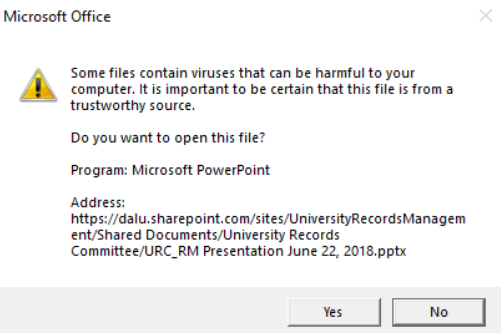Frequently Asked Questions
What is Records Management?
Records Management is the systematic control of all records, regardless of media format, from initial creation to final disposition.
What is a Record?
A record is recorded information that is evidence of an organization’s activity or business, regardless of format.
‘A Record is recorded information, regardless of medium or characteristics, made or received by an organization, that is evidence of its operations and has value requiring its retention for a specific period of time.’ (ARMA International)
What is DalCLASS?
DalCLASS is a function classification tool that supports the university’s Records Management Policy. It is the authority for organizing, retaining and disposing of Dalhousie University Administrative Records.
Does Dalhousie have a records management policy?
Yes. See: Records Management Policy
Does the Records Management Policy apply to all records?
The Records Management Policy only applies to administrative records pertaining to Dalhousie.
Do electronic records have to be treated differently than paper records?
No. The principles underlying records management—creation, retention, identification, retrieval and disposition of records—applies to both electronic and paper records.
Whom do I contact if I have questions regarding records management practices?
For inquiries regarding records management practices, contact the University Records Manager. Contact information is on the Records Management home page.
Does my unit have to apply records management procedures?
Yes. All faculties, departments and units of Dalhousie are obliged to adhere to the Records Management Policy for administrative records. To apply record management procedures, see the Records Management Resources page, and consult the University Records Manager for additional guidance.
What is the purpose of a records retention schedule?
Dalhousie’s record retention schedule, DalCLASS, outlines the timeline of a business activity’s (record’s) operational value. It determines the length of time that records are required to be kept in the custody of the responsible unit. DalCLASS retentions take into consideration operational use as well as requirements and authorities under related legislation(s), privacy and security protocols.
How long do records have to be kept?
Record retention depends on the type of records and the office in which they reside. For more information regarding retention, go to DalCLASS.
Do records have to be destroyed?
Some records do have to be destroyed. Other records are transferred to the University Archives for long-term preservation. Destruction of records depends on numerous factors, including the unit responsible for the record, the type of record, the class under which it it falls, etc. DalCLASS outlines the appropriate disposition of specific records. See also the Records Management Resources page for disposition procedures.
Do committees have to practice Records Management procedures?
There are committees within the administrative structure of Dalhousie that must follow records management practices. See Governance section of DalCLASS for recommended practices for specific committees.
Does a retention schedule have to be followed as written?
Yes. Retention schedules are created to determine the appropriate time for which a record must be kept. It is important to follow the retention schedules as they are written. If DalCLASS does not reflect the record accordingly, please contact the University Records Manager.
What do I do with duplicate records?
Duplicate documents can be securely shredded or permanently deleted.
Do emails have to be kept indefinitely or for a limited time?
When an email documents a university business transaction or operational activity it requires management in accordance with the Records Management Policy. DalCLASS retention times are applied accordingly. When managed improperly, email accounts are at high risk for being hacked or being vulnerable to computer viruses. Unmanaged emails create privacy and security risks. For more information about Email Management go to the Records Management Resources page.
Where can I store records?
Dalhousie’s administrative records should be stored in a Dalhousie-approved repository. The type of information contained in the record (e.g., personal) will determine where it can be stored. Please refer to the Information Security Classification Standards and Guidelines for more detail.
What is considered a Dalhousie-approved records repository?
Please refer to the Information Security Classification Standards and Guidelines regarding Dalhousie-approved storage repositories for records.
Why do I keep receiving this message when opening or saving a document in SharePoint or OneDrive?
This message is triggered because the site’s URL has not been identified as a trusted site on your computer. For instructions on how to add it as a trusted site, follow the instructions provided by Microsoft or contact Dalhousie IT Support for assistance.
What privacy and/or security concerns should be considered with records management?
Share only what information is required for an individual to complete their task. Never put personal information in the subject line of an email. The subject line of email is transferred as open text across the internet. Minimal confidential or sensitive information should be shared via email. For questions regarding privacy concerns, contact Dalhousie’s Privacy Officer.
Does research data fall under records management practices?
Research data does not fall under the university’s Records Management Policy. For inquiries regarding research data, consult Dalhousie’s Data Management Services, Research Data Management and/or Libraries Reference and Research Services.
Can records be transferred to the University Archives for preservation?
Yes. DalCLASS outlines those records that should be transferred to the University Archives. Records can be transferred to the Archives in any format, including electronic. If you have items with possible historical value and they are not identified in DalCLASS please contact the University Records Manager. For more information regarding the transfer of records, consult the Records Management Resources page.

